新外研版八上M4_U1-He_lives_the_farthest_from_school
八年级英语上册 Module 4 Unit 1 He lives the farthest from school教案 (新版)外研版
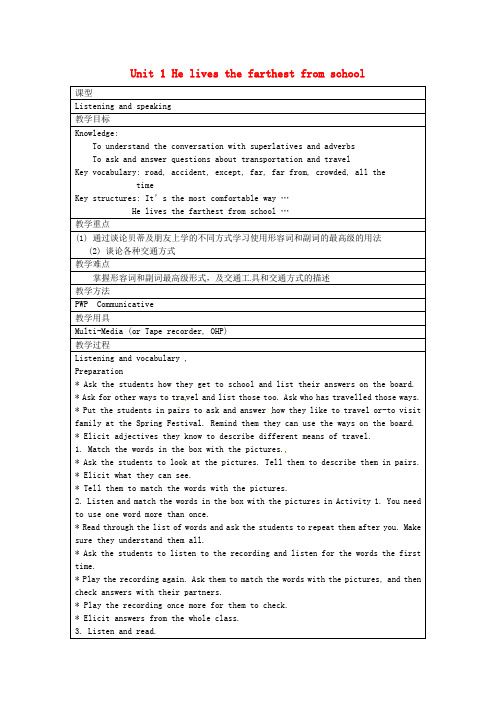
Unit 1 He lives the farthest from school课型Listening and speaking教学目标Knowledge:To understand the conversation with superlatives and adverbsTo ask and answer questions about transportation and travelKey vocabulary: road, accident, except, far, far from, crowded, all thetimeKey structures: It’s the most comfortable way …He lives the farthest from school …教学重点(1) 通过谈论贝蒂及朋友上学的不同方式学习使用形容词和副词的最高级的用法(2) 谈论各种交通方式教学难点掌握形容词和副词最高级形式,及交通工具和交通方式的描述教学方法PWP Communicative教学用具Multi-Media (or Tape recorder, OHP)教学过程Listening and vocabulary ,Preparation* Ask the students how they get to school and list their answers on the board. * Ask for other ways to tra vel and list those too. Ask who has travelled those ways. * Put the students in pairs to ask and answer how they like to travel or-to visit family at the Spring Festival. Remind them they can use the ways on the board. * Elicit adjectives they know to describe different means of travel.1. Match the words in the box with the pictures.* Ask the students to look at the pictures. Tell them to describe them in pairs. * Elicit what they can see.* Tell them to match the words with the pictures.2. Listen and match the words in the box with the pictures in Activity 1. You need to use one word more than once.* Read through the list of words and ask the students to repeat them after you. Make sure they understand them all.* Ask the students to listen to the recording and listen for the words the first time.* Play the recording again. Ask them to match the words with the pictures, and then check answers with their partners.* Play the recording once more for them to check.* Elicit answers from the whole class.3. Listen and read.* Put the students in groups of 3-4 to talk about problems travelling to school. * Elicit their ideas.* Elicit and teach the key vocabulary: road, crowded, accident, etc.* Play the recording. Ask the students to find out the problems and different ways of travelling to school talked about in the conversation.* Play the recording again for them to check.* Elicit answers from the whole class.Now complete the table.* Tell the students to look at the table first.* Play the recording once more while the students read and underline the key information.* Ask them to complete the table on their own, and then check answers with then; partners.* Elicit answers in full sentences from the whole class.4. Com plete the sentences with the correct form of the words in the box.* Read through the words in the box. Ask the students to repeat them chorally and individually.* Ask the students to read thro ugh the sentences first, and then complete them with the correct form of the words in the box on their own.* Ask them to check answers with a partner.* Elicit full sentences from the whole class.5. Complete the sentences with the words or expression in the box.* Read throu gh the words and expression in the box. Ask the students to repeat them chorally and individually.* Ask them to read and complete the sentences on their own.* Elicit full sentences from the whole class.Pronunciatio n and speaking6. Listen and underline the words the speaker stresses.* Ask the students to read through the conversations in pairs.* Tell them to think about which words they think are the important ones and should be stressed.* Decide together. Nominate some students to share their ideas.* Tell the students to listen and check which words are stressed.* Elicit the stressed words.* Ask the students to practise the conversations and exaggerate the stresse d words for the meaning.Now work in pairs. Listen again and repeat.* Play the recording again for the students to listen for the stressed words. * Play the recording once more and pause for the students to repeat chorally and individually.* Have the students ask and answer in pairs.7. Work in pairs. Ask and answer questions about the ways of go ing to school. Use the words in the box to help you.* R ead through the words in the box. Ask the students to repeat them chorally andindividually.* Ask the students to read through the model conversatio n and think about different ways of going to school.* Have the students ask and answer in pairs.* Elicit some conversations from the class.Extension* Tell the student s to mingle and ask their classmates how they travel to school, if they like it and why.* Put the students in groups of six to share what they found out and do a survey. * Ask them to list the students in their groups who travel the same way under the headings "by bike", "by bus", "on foot", etc.* Number the students 1-6 and rearrange the groups by number, (e.g. Ask the students who are No. l to form a new group together.) Then do the same survey as before. * Ask them to pool the information they've got and draw a graph. Then write some sentences about the results, (e.g. In my survey, five people come to school by bus.) * Nominate a few students to share their survey results.。
外研版八年级上册Module 4 Unit 1 he lives the farthest from school

¥50 ¥500 ¥3,506
2. (cheap)
— Which one is the ___c_h_e_a_p_e_s_t____?
— The clock.
3. (popular)
— Which subject is the
_m__o_s_t_p_o_p_u_l_a_r with the
Going by train is Cheaper .
Going by bike the cheapest
is
.
Complete the sentences with the correct form of the words .
Tom
Jack
Mike
1. (fast)
— Who runs the__fa__s_te_s_t___ of the
Unit 1 He lives the farthest from school.
What ways can you travel?
bike
bus
taxi plane
underground subwa
train ship
P26 1 Match the words in the box with the pictures.
How do you go to school? Why?
How does your father go to work? Why?
My friend x x usually goes to school by _____, because it’s ________.
His/Her father…….because it’s……,
初二英语(外研版)M4 Unit 1 He lives the farthest from school 课后练习
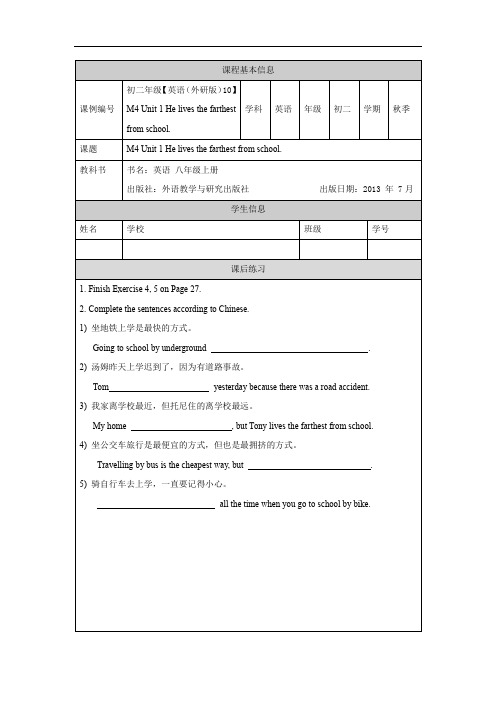
课例编号
初二年级【英语(外研版)10】M4 Unit 1 He lives the farthest from school.பைடு நூலகம்
学科
英语
年级
初二
学期
秋季
课题
M4 Unit 1 He lives the farthest from school.
教科书
书名:英语 八年级上册
出版社:外语教学与研究出版社 出版日期:2013 年 7月
学生信息
姓名
学校
班级
学号
课后练习
1. Finish Exercise 4, 5 on Page 27.
2. Complete the sentences according to Chinese.
1)坐地铁上学是最快的方式。
Going to school by underground.
2)汤姆昨天上学迟到了,因为有道路事故。
5)骑自行车去上学,一直要记得小心。
all the time when you go to school by bike.
Tomyesterday because there was a road accident.
3)我家离学校最近,但托尼住的离学校最远。
My home, but Tony lives the farthest from school.
4)坐公交车旅行是最便宜的方式,但也是最拥挤的方式。
Travelling by bus is the cheapest way, but.
外研版八年级英语上册Module 4 unit 1 He lives the farthest fr
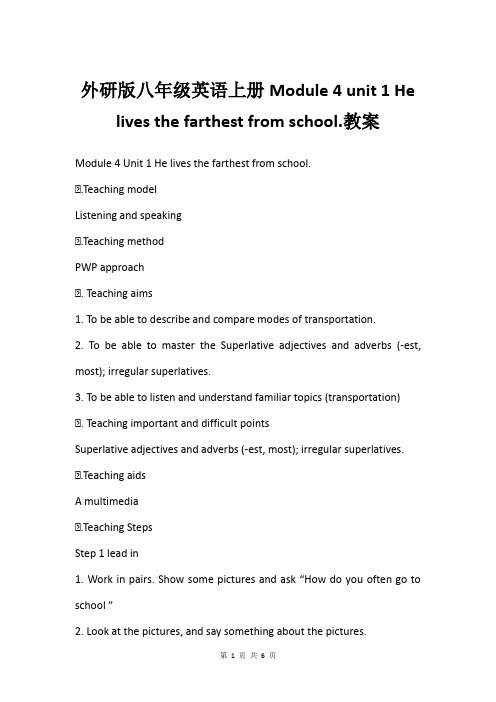
外研版八年级英语上册Module 4 unit 1 He lives the farthest from school.教案Module 4 Unit 1 He lives the farthest from school.Ⅰ.Teaching modelListening and speakingⅠ.Teaching methodPWP approachⅠ. Teaching aims1. To be able to describe and compare modes of transportation.2. To be able to master the Superlative adjectives and adverbs (-est, most); irregular superlatives.3. To be able to listen and understand familiar topics (transportation)Ⅰ. Teaching important and difficult pointsSuperlative adjectives and adverbs (-est, most); irregular superlatives.Ⅰ.Teaching aidsA multimediaⅠ.Teaching StepsStep 1 lead in1. Work in pairs. Show some pictures and ask “How do you often go to school ”2. Look at the pictures, and say something about the pictures.3. Introduce the new words.4. Learn the new words.5. Read the new words.Step 2 presentation and practice1. Ask the students to read the words in Activity 1.bus ship taxi train underground2. Look at the pictures in Activity 1 carefully.3. Now match the words with the pictures.5. Ask the students to check their answer with a partner.6. Call back the answer from the whole class and check the answer.Step 3 pre-listening1. Ask the students to read the words in Activity2.busy cheap expensive modern2. Play the recording and ask the students to listen to the recording carefully.3. Listen and match the words in the box with the pictures in Activity 1. You need to use one word more than once.4. Ask the students to check their answer with a partner.5. Call back the answer from the whole class and check the answer.Step 4 Listening and reading1. Show some pictures, and ask the students to talk about them.2. Ask the students to read the conversation silently.3. Play the recording and ask the students to listen and read the conversation.4. Read the conversation.5. Act it out.6. Learn “Everyday English”1) What happened2) Don’t worry.Step 5 Reading practice1. Ask the students to read the conversation again.2. Now complete the table.Betty Tony Lingling DamingWays to go to school3. Ask the students to check with a partner.4. Check the answers:Step 6 practice1. Ask the students to read the words in the box in Activity 4.close comfortable good far2. Read through the sentences.1) Lingling lives the ________ to school, so she always walks.2) The _________ way to go to school is by taxi.3) Tony lives the ___________ from school.4) For Betty, going to school by bike is the _________ choice.3. Complete the sentences with the correct words from the box.4. Ask the students to check with a partner.5. Check the answers:Step 7 Complete the sentences.1. Ask the students to read the words or expression in the box in Activity 5.crowded except modern road accident2. Read through the sentences.1) All the students take the bus to school ___________ Sam.2) The ___________ train in the world is the Shanghai airport train.3) I saw a(n) __________ on the way to school yesterday.4) I do not take the bus to school because it is usually very ___________.3. Complete the sentences with the correct words from the box.4. Ask the students to check with a partner.5. Check the answers:Step 8 speaking1. Play the recording once without stopping.2. Play the recording again and ask the whole class to repeat.1) —Who lives the closest to school— Lingling lives closest.2) — Whah is the most comfortable way to go to school for Betty— By taxi.3. Ask the students to listen and mark the intonation.4. Now listen again and repeat.Step 9 speaking practice1. Ask the students to read the words or expression in the box in Activity 7.2. Read through the example with the class.— What’s the most expensive way to go to school— Going by taxi is the most expensive.3. Work in pairs.Step 10 Important and difficult points1. Maybe I should go to school by taxi. 或许我应该坐出租车去上学。
外研版八年级英语上册 Module 4 Unit 1 He lives the farthest from school教学设计
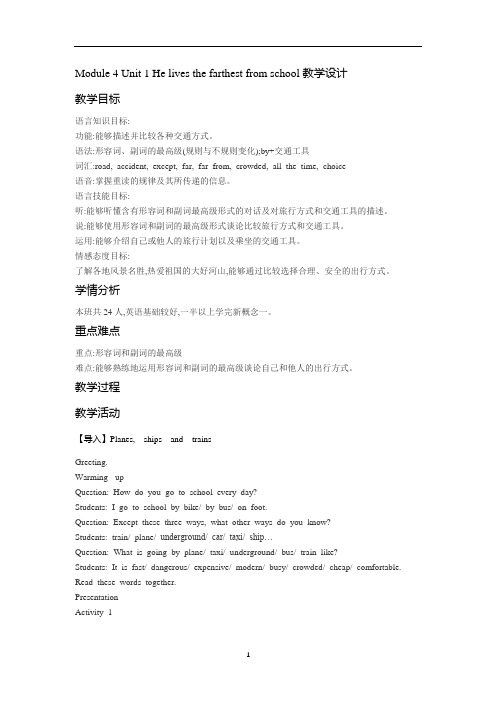
Module 4 Unit 1 He lives the farthest from school教学设计教学目标语言知识目标:功能:能够描述并比较各种交通方式。
语法:形容词、副词的最高级(规则与不规则变化);by+交通工具词汇:road, accident, except, far, far from, crowded, all the time, choice语音:掌握重读的规律及其所传递的信息。
语言技能目标:听:能够听懂含有形容词和副词最高级形式的对话及对旅行方式和交通工具的描述。
说:能够使用形容词和副词的最高级形式谈论比较旅行方式和交通工具。
运用:能够介绍自己或他人的旅行计划以及乘坐的交通工具。
情感态度目标:了解各地风景名胜,热爱祖国的大好河山,能够通过比较选择合理、安全的出行方式。
学情分析本班共24人,英语基础较好,一半以上学完新概念一。
重点难点重点:形容词和副词的最高级难点:能够熟练地运用形容词和副词的最高级谈论自己和他人的出行方式。
教学过程教学活动【导入】Planes,ships and trainsGreeting.Warming- upQuestion: How do you go to school every day?Students: I go to school by bike/ by bus/ on foot.Question: Except these three ways, what other ways do you know?Students: train/ plane/ underground/ car/ taxi/ ship…Question: What is going by plane/ taxi/ underground/ bus/ train like?Students: It is fast/ dangerous/ expensive/ modern/ busy/ crowded/ cheap/ comfortable. Read these words together.PresentationActivity 1In our book, there are also some pictures of the ways of going, let’s have a look togethe r.Question: What’s this?Students: Train/ bus …Activity 2Listen and match the words with the pictures.Check the answers together.Listen again and match the phrases together, and pay attention to the whole sentence. Check the answers one by one.Read the sentences together.Activity 3Betty took the bus to school today, but she was late. And now she is talking about some thing with her mum, let’s listen and try to find out what they are talking about.Listen and answer 3 questions.Question 1: What are they talking about?Question 2: Who lives the farthest from school?Question 3: Finally, how does Betty go to school?Listen again and complete the table.WhyWhat’s it like?By bikeQuestion: How does Tony go to school and why?Question: What is going by underground like?Question: How about Lingling?/ Why?/ What is going on foot like?Question: How about Daming?/ What is going by bus likeTeacher: There is still another way of going in our dialogue, remember? What is that? Students: By taxi.Teacher: What is it like?Students: It is the most comfortable way, but it’s also the most expensive.Teacher: After comparing so many ways, finally, Betty decides to go to school by …Wha t is it like?Students: Bike, dangerous.Teacher: so in the end, what does her mum say?Students: Remember to be careful all the time.Teacher: Excellent! How does her mum feel?Students: worried!Teacher: Yes, her mum is worried about Betty, so are your parents. When you go out or when you go to school, your parents must be very worried about you too. So what shoul d you do?Students: Remember to be careful all the time!Read after the radio. Pay attention to you intonation.Practice reading or retelling in pairs.Check reading or retelling, and try to act it out. (6组)ConsolidationWork in groupsLeading- inWe all know that the National Day is coming, do you have some plans of travelling? So me students say yes, but some say no.T: Hello, Zhao Rui, do you have some plans during the National Day?S:No, I don’t.T: Really? How about going to the Labor Park with me?S: Er… That’s a good idea! How are you going there?T: I’m going there by underground, because it is the fastest way and it’s also the most c omfortable. How about you?S: I don’t like going there by underground, because it is the most boring way. I am goin g there on foot, because my home is the closest to it, and it is also the most relaxing an d the most interesting way. I can also have a lot of fun on my way there.T: Yes, you are right! I will go there on foot, too. See you then.S: Bye-bye!Make it clear.Make an interview: about the ways to go there.1 reporter3 studentsSomewhere togetherBy bus/ bike/ car/ plane/ ship/ coach/ underground…Superlative adjectivesSee? Work in groups. Suppose you are going somewhere together, but you have different ideas about the ways to go there. Of course you should tell us why, just like what Zhao Rui and I did just now. And try to use superlative adjectives and adverbs here. Four stud ents work in a group, and one student is the reporter. He or she is making an interview with the other three students about the ways to go there. Understand? Let’s do it togethe r!Practise in groups3 groups act their dialogue out at the front.More exercises about the superlative adjectives and adverbs.Do it together and one student come the blackboard.Check the answers one by one by reading it aloud.Read the sentences together and pay attention to the superlative adjectives and adverbs. SummaryWatch the video.HomeworkA+B or A+C, it is up to you!Thank you!。
外研版八年级英语上册《Module 4 Unit 1 He lives the farthest from school》课件
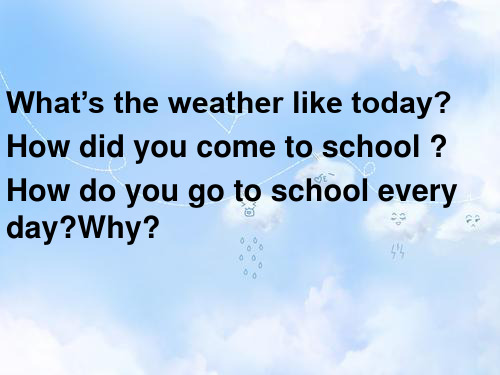
Difficult points:
The form of superlative adjectives
生 词 书 签
road n. 路; (尤指) 公路
accident n. 交通事故; 意外事件
Tony.But sometimes I take a taxi. It’s the fastest way, but ow do you go to school every day? Why?
• I often go to school on foot (walk to school)because I live near school.(My home is close to school.)
1. To understand conversations with superlative adjectives.
2. To ask and answer questions about transport and travel.
The teaching points:
Important points: 1. Important words and expressions:bus, subway,
journey n. 旅行; 旅程
classmate n. 同班同学
except prep. 除……之外 e.g. I like every subject except math. 除了数学我每个学科都喜欢。
What’s the weather like today? How did you come to school ? How do you go to school every day?Why?
外研版八年级英语上册Module 4 unit1 He lives the farthest from school.教案
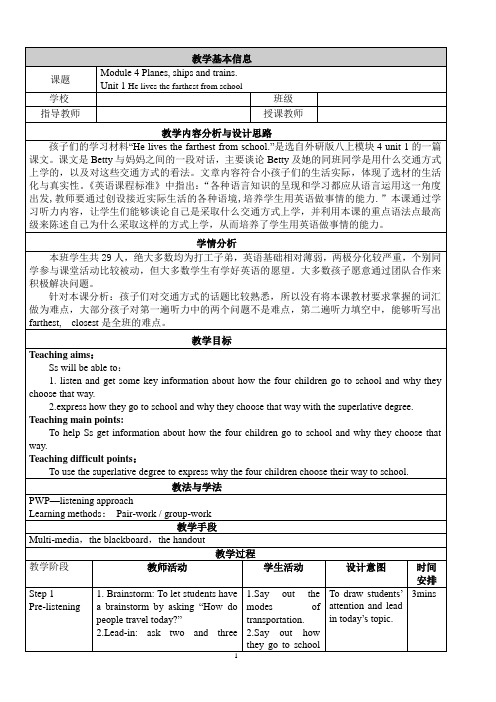
Ask students to listen and answer two questions. It’s the first time listening for the main idea.
2. Listen and fill in the blanks. It’s the 2ndtime listening. By listening, most of students can know how Betty, Tony, Ling ling and Daming go to school and whythey choose that way.
Listen carefully and answer the questions and fill in the blanks after 2ndtime listening.
To get to know the main idea of the listening and know how Betty, Tony, Lingling and Daming go to schooland the reasons.
13mins
Step 3
Post-listening
1. Listen and imitate :Ask students to practise reading the textafter the tape.
2.Askstudentsto read the text and fill in the blanks, then students read the passage together.At last, ask them to close their books, and this time it is the retelling time, ask them to retell the text together.
新外研版八年级英语上Module_4_Unit_1He_lives_the_farthest_from_school
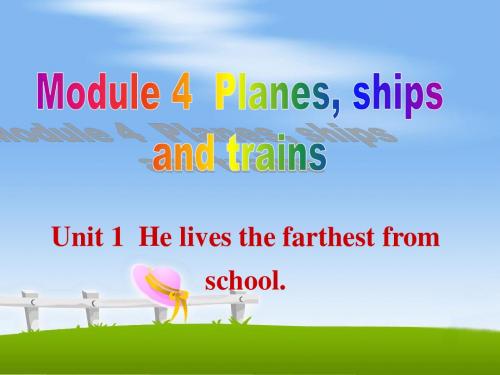
How does she go to school ?
She walks to school. She goes to school on foot.
--How do you go to school ?
--I go to school by bus. = I take a bus to school .
1
你有哪些收获?
2
你有哪些需要注意的问题?
3 你(你的学友表现怎么样?)
Try to talk about how you and your
classmates go to school. Try to use the Superlatives and by + means of transport.
Unit 1 He lives the farthest from
school.
单词预习展示
road accident except far far from crowded classmate
n. n. prep. adj. adv.
adj.
n.
路;(尤指)公路 交通事故;意外事件 除……之外 远的;遥远的 远;遥远 远离 拥挤的;人数过多的 同班同学
farthest the farthest Tony lives ___________from the school.
Ways to go to school Betty Tony by bus by underground walk / on foot by bus
※ 先独立完成——然后师友交流
except I go to school _______ Sunday and Saturday
除 …以外
外研版八年级英语上册Module 4 unit 1 He lives the farthest fr
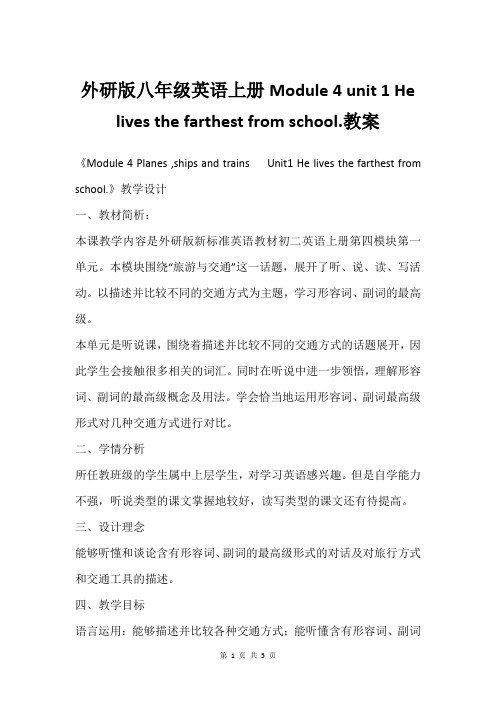
外研版八年级英语上册Module 4 unit 1 He lives the farthest from school.教案《Module 4 Planes ,ships and trains Unit1 He lives the farthest from school.》教学设计一、教材简析:本课教学内容是外研版新标准英语教材初二英语上册第四模块第一单元。
本模块围绕“旅游与交通”这一话题,展开了听、说、读、写活动。
以描述并比较不同的交通方式为主题,学习形容词、副词的最高级。
本单元是听说课,围绕着描述并比较不同的交通方式的话题展开,因此学生会接触很多相关的词汇。
同时在听说中进一步领悟,理解形容词、副词的最高级概念及用法。
学会恰当地运用形容词、副词最高级形式对几种交通方式进行对比。
二、学情分析所任教班级的学生属中上层学生,对学习英语感兴趣。
但是自学能力不强,听说类型的课文掌握地较好,读写类型的课文还有待提高。
三、设计理念能够听慬和谈论含有形容词、副词的最高级形式的对话及对旅行方式和交通工具的描述。
四、教学目标语言运用:能够描述并比较各种交通方式;能听懂含有形容词、副词最高级形式对话。
文化意识:主动了解英语国家有关旅游和交通等方面的信息,并将之与自己的日常生活联系起来,拓展视野。
情感态度:通过了解各地风景名胜,热爱祖国的大好河山,选择合理、安全的出行方式学习策略:培养自主学习的能力与合作精神,在活动中去参与和体验,运用英语。
五、教材重、难点词语.:road, accident, except, choice, far from, close, crowded, all the time语法:形容词、副词的最高级;by+交通工具,(难点)语言知识:1.To understand the conversation with superlative adjectives and adverbs2.To ask and answer questions about transportation and travel六、教具准备多媒体课件七、课时安排1课时八、教学方法小组自主,合作、讨论及任务型教学法九、教学过程【课前延伸】预习并掌握词汇、语法1.Read after the teacher .Words and Phrases: by bus乘公共汽车far from远离road accident交通事故heavy traffic交通繁忙take the underground乘地铁closest to最近的the same as 和…相同all the time 一直2.检查形容词、副词比较级和最高级的规则与不规则变化【课内探究】Step1:导入新课:1.Match the words in the box with the pictures.(本活动旨在让学生了解不同的交通出行方式,为后面的听力活动作好铺垫)1.开展小组活动,共同讨论图片所呈现的交通方式并完成匹配。
外研版八上英语M4知识点

M4 Unit1 He lives the farthest from school他住的离学校最远1.I was late for school today. 我今天上学迟到了be late for 干。
迟到2.But nobody was late,except me. 除了我没有人迟到。
Except 除去。
3. I took the bus. Maybe I should go to school by taxi.我坐公共汽车,也许我应该打车去学校。
Take+the +交通工具by+交通工具表示乘,坐should do sth 应该做某事should 是情态动词,后面应该用动词原形4. it’s the most comfortable way, but it’s also the most expensive.它是最舒服的方式,但是也是最贵的。
最高级前面应该加定冠词the5. what about going by bike? 骑自行车去怎么样?What about doing sth?做什么怎么样about是介词,后面加动名词6.take the underground 坐地铁the closest to school 离学校最近7. he goes by bus too, the same as me. 他也坐公交车,和我一样。
the same as 和。
一样8. you can ride your bike to school,but remember to becareful all the time. 你可以骑自行车去学校,但是记住要时刻注意安全。
Unit 2 what is the best way to travel?旅游的最好方式是什么1.what is the best way to travel from London to Amsterdam? 从伦敦去阿姆斯特丹的做好旅行方式是什么?the best way to do sth 做某事的最好方式from….to…..从。
外研版八年级英语上册M4 Unit 1 He lives the farthest from sch
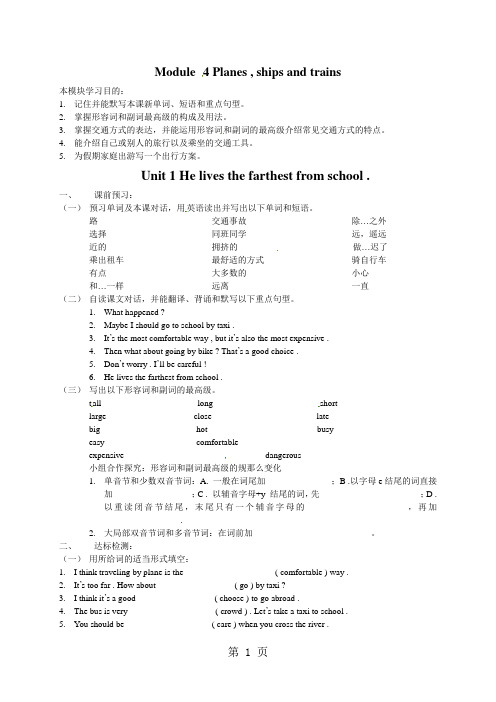
Module 4 Planes , ships and trains本模块学习目的:1.记住并能默写本课新单词、短语和重点句型。
2.掌握形容词和副词最高级的构成及用法。
3.掌握交通方式的表达,并能运用形容词和副词的最高级介绍常见交通方式的特点。
4.能介绍自己或别人的旅行以及乘坐的交通工具。
5.为假期家庭出游写一个出行方案。
Unit 1 He lives the farthest from school .一、课前预习:(一)预习单词及本课对话,用英语读出并写出以下单词和短语。
路交通事故除…之外选择同班同学远,遥远近的拥挤的做…迟了乘出租车最舒适的方式骑自行车有点大多数的小心和…一样远离一直(二)自读课文对话,并能翻译、背诵和默写以下重点句型。
1.What happened ?2.Maybe I should go to school by taxi .3.It’s the most comfortable way , but it’s also the most expensive .4.Then what about going by bike ? That’s a good choice .5.Don’t worry . I’ll be careful !6.He lives the farthest from school .(三)写出以下形容词和副词的最高级。
t all long shortlarge close latebig hot busyeasy comfortableexpensive dangerous小组合作探究:形容词和副词最高级的规那么变化1.单音节和少数双音节词:A. 一般在词尾加______________ ;B .以字母e结尾的词直接加_________________ ;C . 以辅音字母+y 结尾的词,先______________________ ;D .以重读闭音节结尾,末尾只有一个辅音字母的______________________ ,再加_________________ .2.大局部双音节词和多音节词:在词前加__________________________ 。
新外研版八年级上册M4U1He lives the farthest from school上课课件教学提纲
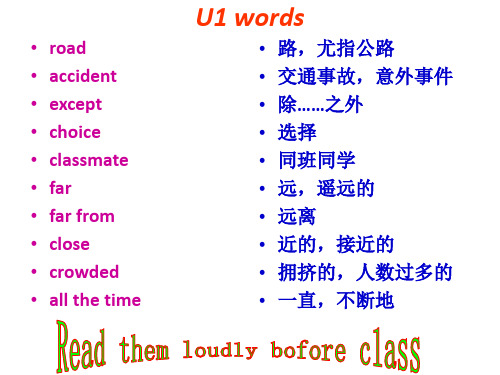
except, except for与besides的区别
• (1)except意为“除……之外(不再有)”; 除汤姆外,我们都通过了考试。(整体中汤姆一人不及格)
We all passed the exam except Tom.
• (2)except for...意为“除去……一点外”,表示“先做整体评价, 然后再就局部提出一点看法”。即肯定整体, 否定部分
变化规则
• 1一般是加est, • 如 oldest shortest longest • 2 以e结尾的加st , • 如widest nicest largest latest • 3 以重读闭音节结尾的词,如末尾只有一个辅
音字母,应先双写该字母,再加-est, • 如;biggest hottest • 4以“辅音字母+y”结尾的词,先把y变成i,再加-est. • 如 busy-busiest early-earliest • 5多音节形容词变最高级时加most • 如the most beautiful • 6.不规则变化 • 如farthest, least, most, best, worst
Learning goals
• 1能扎实掌握M4U1的10个单词和12个 短语,能读懂有关旅游和交通方面的 文章
• 2通过自主学习和合作探究,掌握形容 词、副词最高级的用法,并运用到对 话中。
• 3关注旅游和交通信息,培养热爱祖国 大好河山的情操。
形容词、副词的最高级
两者比较用形容词或副词的比较级,当我 们要将三个或以上的事物进行比较时,要用它 们的最高级。例如: 1. Lingling’s home is the closest to school. 玲玲家离学校最近。(形容词的最高级前要用
八年级英语上册Module4Unit1Helivesthefarl新版外研版
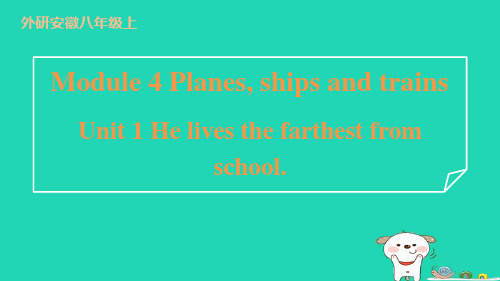
返回
( C )15. Emma looked after her pet dog ________ of all her
friends.
A. careful
B. most careful
返回
B: But it’s too expensive to take the plane.
A: You can also go by train. 23. ____B____
B: What about taking the coach? A: 24. ___C_____ But it takes the
【点拨】考查happen 的用法。当表达碰巧 做某事时, 用“happen to do sth. ”。
返回
9. The Yellow River is the second _l_o_n_g_e_s_t _ (long) river in China.
【点拨】考查最高级的用法。句意: 黄河是中国的 第二长河。最高级前可以有序数词修饰。
plans for this winter vacation? F. Because the train station is near your home. G. You can go by subway.
返回
B: So what is the best way to Xi’an?
A: I think the best way is by train. 25. ____F____ You can save a lot of time on the way to the station.
外研八上教案:M4U1 He lives the farthest from
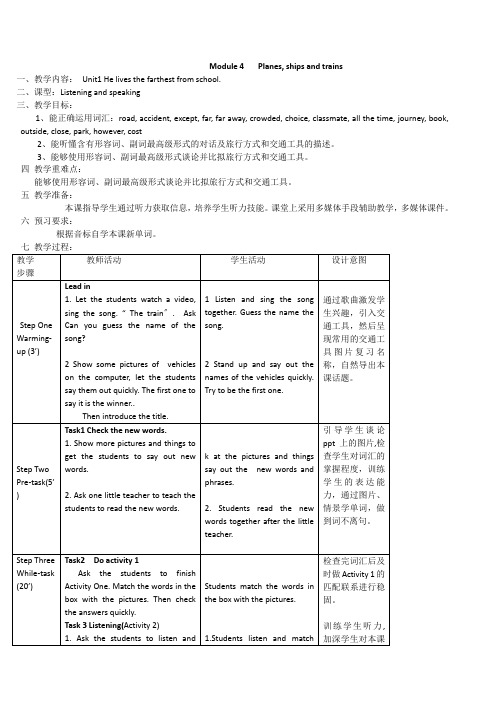
Module 4 Planes, ships and trains一、教学内容:Unit1 He lives the farthest from school.二、课型:Listening and speaking三、教学目标:1、能正确运用词汇:road, accident, except, far, far away, crowded, choice, classmate, all the time, journey, book, outside, close, park, however, cost2、能听懂含有形容词、副词最高级形式的对话及旅行方式和交通工具的描述。
3、能够使用形容词、副词最高级形式谈论并比拟旅行方式和交通工具。
四教学重难点:能够使用形容词、副词最高级形式谈论并比拟旅行方式和交通工具。
五教学准备:本课指导学生通过听力获取信息,培养学生听力技能。
课堂上采用多媒体手段辅助教学,多媒体课件。
六预习要求:根据音标自学本课新单词。
七教学过程:达标训练题A. 随学随练:写出以下单词的最高级形式:1. short _________________2. nice _________________3. big _________________4. thin _________________5. early _________________6. slowly _________________7. beautiful _________________8. carefully _________________9. badly _________________ 10. much _________________11. little _________________ 12. far __________________B. 单项选择:( ) 1. Debbie is growing fast. She is even________ than her mother.A. tallB. tallerC. tallestD. the tallest ( )2.—Dad, would you please drive ________?— No hurry. We have enough time before the plane takes off.A. fasterB. more slowlyC. more carefully( ) 3.—Do you know Lin Shuhao?—Yes. He is one of _____ basketball players in the NBA.A. popularB. more popularC. the most popular( ) 4. Is Lily’s home _____ away from school than Linda’s?A. farB. fartherC. farthest .( ) 5.—Who ran ______ of all in the sports meeting?—Hector did, I think.A. fastB. fasterC. the fastestD. most fast( ) 6. Li Na is ________ tennis player in China now.A. most famousB. the most famousC. more famousUnit 1 In China, we open a gift later.教学目标【知识目标】1、能够正确使用以下单词和词组:cap, chopstick, toy, video game, gift, surprise, immediately, difference, accept, tradition, example, for example, must, month, serious, taste2、能够正确使用must, mustn’t, can, can’t, need, needn’t。
新外研版八年级上册M4U1He lives the farthest from school上课课件
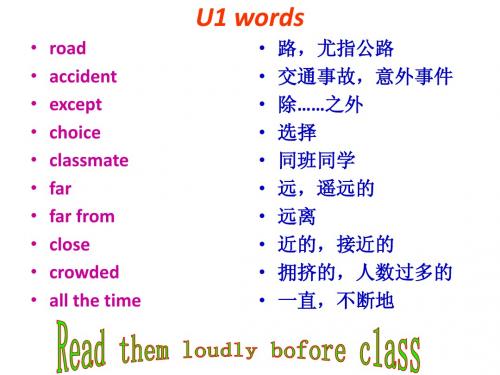
Match the words in the box with the pictures. bus ship taxi train underground
Listen and match the words in the box with the pictures in Activity 1. You need to use one word more than once.
注意:在表示“A比B……”时,我们用A is
… than B,但最高级表达的是三个及三个
以上的事物的比较状况,所以后面通常用
in/of/among… 来表示比较的范围。例如:
Tom is the tallest in our class.
Tony lives the closest to school of all my
Show off
展示内容 展示方式 评价小组
G6
要求
1展示同学迅 速,板书归整 ,内容齐全
形容词、副词 G4、G3前 最高级变化规 黑板 则,举例说明
分角色朗读 口头 课文
自由点评
2 点评同学声
音洪亮,大方 ,其他同学大 胆质疑
1. Maybe I should go to school by taxi. 或许我应该坐出租车去上学。 by和表示交通工具的名词(名词前没有 任何冠词)连用,意思是“乘、坐”。
变化规则
随学随练 写出下列单词的最高级形式:
1. short → 2. nice → 3. big → 4. thin → 5. early → 6. slowly → shortest _________________ nicest _________________ biggest _________________ thinnest _________________ earliest _________________ most slowly _________________
八年级英语上册Module4 Unit1 He lives the farthest from school课件 (新版)外研版
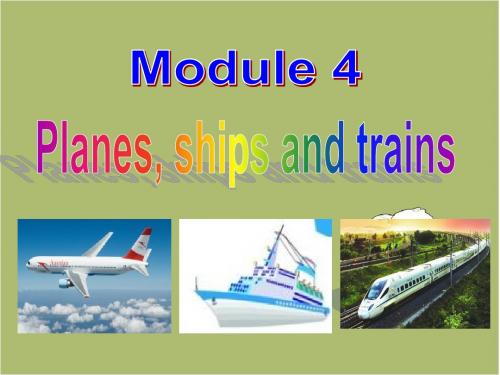
Pair work
A: How do you go to school ? B: I go to school by… /I take the…to school. A: How does your father/mother go to work? B: He/She goes to work…
1.Match the words in the box with the pictures. bus ship taxi train underground train
ship
taxi
underground
bus
2.Listen and match the words in the box with the pictures in Activity 1. You need to use one word more than once.
Unit1 He lives the farthest from school.
plane
ship bus
underground taxi
Transportation by
train
car
bn go to school?
I always go to work by bike. I always ride a bike to school. I sometimes walk to school. I sometimes go to school on foot. Daming goes to school…
Work in pairs
bike bus cheap comfortable crowed expensive fast popular safe taxi underground walking
八年级英语上册_Module 4 Unit 1 He lives the farthest from school教案 (新版)外研版
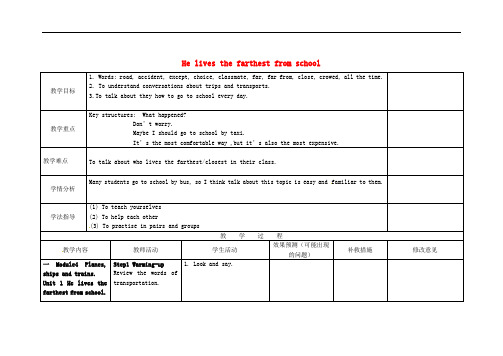
Step10 Work in pairs.
-What’s the most expensive way to go to school?
-Going by taxi is the most expensive.
…
1.Lookand say.
Unit 1 He lives the farthest from school.
二.Activity 1
三.Activity 2
四Activity3
五Activity
六Activity5
七Activity6
八Activity7
Step1 Warming-up
Review the words of transportation.
3.To talk about they how to go to school every day.
教学重点
Key structures:What happened?
Don’t worry.
Maybe I should go to school by taxi.
It’s the most comfortable way ,but it’s also the most expensive.
2. Look at the pictures and say the English words.
e.g. bus- by bus/ train – by train/…
3Ask and answer.
4.Write the words next to the pictures.
5 Read these words together.
外研八上M4U1 He lives the farthest from school
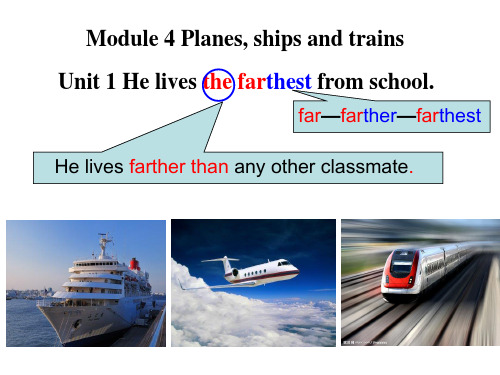
①
②
③
④
⑤
modern
cheap
expensive busy
cheap
Boy: What's t_h_e_m__o_s_t _m_o_d_e_r_n__train in the world now? Fill Girl: Mm... I think it's the Shanghai airport train.
heavy traffic
除了...之外
Listening
What does Betty’s mum think of going to school by taxi? She thinks it’s __th_e__m_o_s_t_c_o_m_f_o_r_ta_b_le__w_a_y___, but it’s also ___ t_h_e_m__o_st_e_x_p_e_n_s_i_v_e way. And taxis are _s_lo_w_ in heavy traffic too.
Boy: What's ___________ underground in the worid? Girl: I think it'tshtehechTeoakpyeostunderground.
Boy: What's _____________ way from England to France?
重fa读t 闭音节双st
big
bigger—the biggest
expensive comfortable exciting
more more more
部加ecexox分mpmcioetfn双rionsergit音,va–eb节最t—lhee或高t–hmet多级homes音前tomes节面oxt scet比加ixtcipno较tegmhn级esfiov在mretoa前sbtle面.
- 1、下载文档前请自行甄别文档内容的完整性,平台不提供额外的编辑、内容补充、找答案等附加服务。
- 2、"仅部分预览"的文档,不可在线预览部分如存在完整性等问题,可反馈申请退款(可完整预览的文档不适用该条件!)。
- 3、如文档侵犯您的权益,请联系客服反馈,我们会尽快为您处理(人工客服工作时间:9:00-18:30)。
• What’s the most expensive way to go to school? • What’s the most busiest way to go to school? • What’s the most cheapest way to go to school? • What’s the most modern way to go to school?
5
Complete the sentences with the words or expression in the box. accident crowded except most modern 1. All the students take the bus to school except ________ Sam.
2. Tony lives the ________ from farthest school.
3. Lingling’s home is the _______ closest to school, so she always walks. 4. For Betty, going to school by best bike is the _____ choice.
4 Complete the sentences with the correct form of the words in the box.
close comfortable far good
1. The _______________ way to go most comfortable to school is by taxi.
2. The ____________ train in the world is most modern the Shanghai airport train. 3. I saw a(n) accident on my way to school _______ yesterday. 4. I do not take the bus to school because crowded it is usually very ________.
7 Work in pairs. Ask and answer questions about the ways of going to school. Use the words in the box to help you. bike bus cheap comfortable crowded expensive fast popular safe taxi underground walking
3 Listen and read, and then complete the table. Ways to go to school
Betty Tony Lingling
by bus by underground on foot/ walk by bus
Damingຫໍສະໝຸດ Read and have a role-play.分角色 朗读
Quiz
注: word 文档 点击此处链接
一、根据句意及首字母提示, 补全下列单词。 rowded 1. He jumped on the c_______ bus. xcept 2. The restaurant is open every day e______ Monday. losest 3. This station is our c_______ one to our home. lassmates 4. We were c___________ at middle school. ccident 5. He was killed in a car a_________.
Module 4 Planes, ships and trains
Unit 1
He lives the farthest from school.
What modes of transportations do you know? Can you list some?
1 Match the words in the box with the pictures. bus ship taxi train underground
二、根据所学的句型结构翻译句子。 1.请记得带上礼物。 Please remember to take the present. ___________________________________ 2. 他对现代艺术很感兴趣。 He is interested in modern art. ___________________________________ 3. 练习是学习英语最好的方法。 Practice is the best way to learn English. ___________________________________ 4. 地球一直绕着太阳转。 The earth moves around the sun all the time. ___________________________________
课后回顾
本课时主要句型
1) How do you go to school? 2) What happened? 3) Don’t worry. 4) He lives the farthest from school. 5) -What’s the most comfortable way to go to school? -By taxi.
三、列举和交通工具有关的词。
n. bus ship taxi underground plane …
adj. comfortable expensive cheap dangerous safe crowded quiet …
